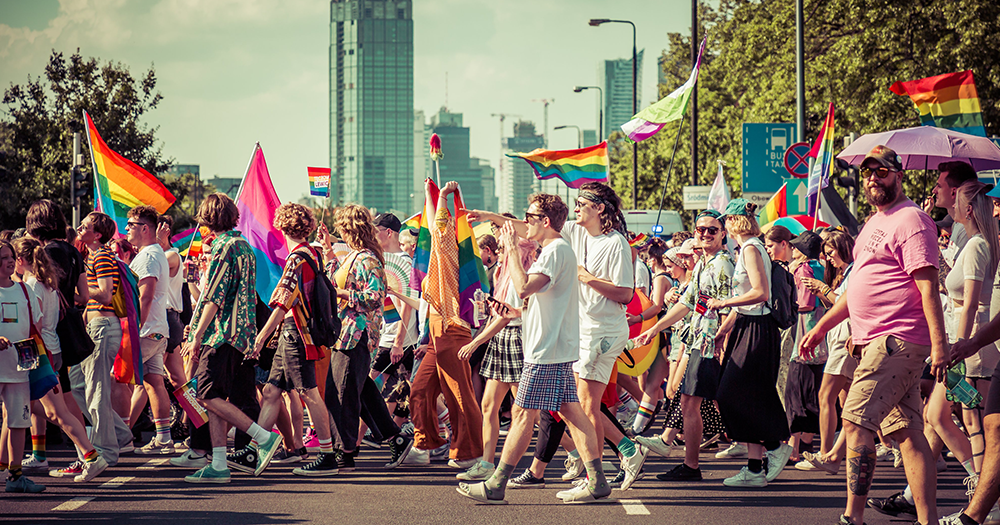Content Warning: Descriptions of homophobia.
Amnesty International has released a report analysing the trajectory of the human rights situation for LGBTQ+ people in Poland. It details the growing discrimination faced by LGBTQ+ people and activists, focusing particularly on the limits being imposed on the freedom to peacefully assemble and freedom of expression.
The report focuses on the human rights situation from 2017 until 2021, using qualitative research methods carried out between October 2021 and May 2022. Amnesty Internation conducted 54 interviews with 49 individuals, of whom 44 self-identified as LGBTQ+.
Research regarding government responses to queer groups occurred through desk research, consultations with experts and analysis of official correspondence between representatives of the Polish government and the Commissioner for Human Rights. The content of the parliamentary questions regarding anti-LGBTQ+ hate crimes and refugees were also examined.
The report found that LGBTQ+ people in Poland experience extensive barriers in access to justice, interference in judicial proceedings by the Ministry for Justice and Prosecutor General and a clampdown on their rights to freedom of expression and peaceful assembly.
Deliberate attempts to force LGBTQ+ individuals out of civic spaces have been a consistent trend, introducing legislation that limits education on sexual and reproductive rights. NGOs advocating for LGBTQ+ rights also face extreme backlash and endure smear campaigns.
With testimonials gathered from interviews, Amnesty International has found that many LGBTQ+ rights defenders face particularly hostile and substandard treatment from law enforcement. Through the misuse of the criminal justice system, activists are being silenced and undergoing expensive legal proceedings.
? NEWS ? Authorities in Poland are responsible for persistent hateful rhetoric against LGBTI people in #Poland and are failing to protect these communities from violent and discriminatory acts, according to our new report.
Read @amnestyPL's findings ⬇️
— Amnesty Ireland (@AmnestyIreland) July 20, 2022
Repeated court cases to prove that LGBTQ+ symbols are protected under the right to freedom and expression have also taken place.
Such experiences have had a chilling effect that deters LGBTQ+ people from engaging in peaceful activism and causing a deterioration in their quality of life.
Poland is a State Party to the 1966 International Covenant on Civil and Political Rights, legislation that governs the freedom of assembly. However, in 2017 The Law on Assemblies was introduced, requiring organisers to notify the municipality of their intention to organise an assembly.
The report from Amnesty International found that such legislation has been used to prevent the conduct of peaceful assemblies and disproportionately targets LGBTQ+ gatherings. These events are illegitimately shut down under the pretext of violating public order.
The law has been instrumental in restricting the freedoms of LGBTQ+ people, furthered by the introduction of ‘preventative bans’. These allow the government to stop gatherings taking place under the guise of it being illegal or offensive.
It has made the process of notifying assemblies more difficult by piling on additional requirements for organisers of Equality Marches and Pride Parades. The ‘preventative bans’ allow local authorities to prohibit an assembly from taking place and force the organisers to appear in court.
Both the Polish Ombudsman and the Commissioner for Human Rights at the Council for Europe have intervened in cases of preventing bans targeting LGBTQ+ assemblies due to their arbitrary and discriminatory application.
The report by Amnesty International also found worrying evidence that attacks on LGBTQ+ people at peaceful gatherings have increased exponentially. This has been furthered by the governments campaigning against LGBTQ+ rights that intensified during the 2019 presidential campaign.
One such example from July 2019 has shown a lack of protection at these gatherings. A group of under 1,000 people taking part in the first Equality March in Bialystok were attacked by a crowd of 4,000 counter-demonstrators, including far-right hate groups. People attending the march were attacked with bottles, stones and firecrackers.
Specific concerns have been raised about a 2020 event that has become known as Rainbow Night. Police officers used unnecessary and excessive force, alongside other unlawful tactics. A number of protesters and bystanders were detained arbitrarily. Overall 48 people were arrested during the protests.
Responses to LGBTQ+ activism and existence have been extremely hostile, with efforts made to silence individuals. A way in which this has been occurring is through the implementation of “LGBTQ-free zones”, areas of Poland that have officially declared themselves to be unwelcoming to the queer community.
The lack of specific hate crime provisions in the law prevents LGBTQ+ people from reporting instances of harassment and hate crimes, allowing those who commit such acts to remain unprosecuted.
The report ends with a number of suggestions for the Polish government regarding legislative suggestions to ensure the protection of LGBTQ+ rights and the freedom of expression. The report is available to read in full.
© 2022 GCN (Gay Community News). All rights reserved.
Support GCN
GCN is a free, vital resource for Ireland’s LGBTQ+ community since 1988.
GCN is a trading name of National LGBT Federation CLG, a registered charity - Charity Number: 20034580.
GCN relies on the generous support of the community and allies to sustain the crucial work that we do. Producing GCN is costly, and, in an industry which has been hugely impacted by rising costs, we need your support to help sustain and grow this vital resource.
Supporting GCN for as little as €1.99 per month will help us continue our work as Ireland’s free, independent LGBTQ+ media.
